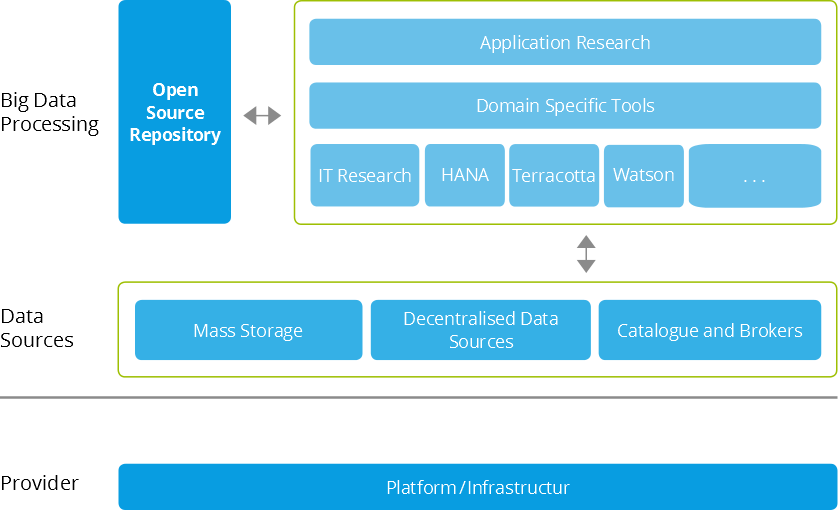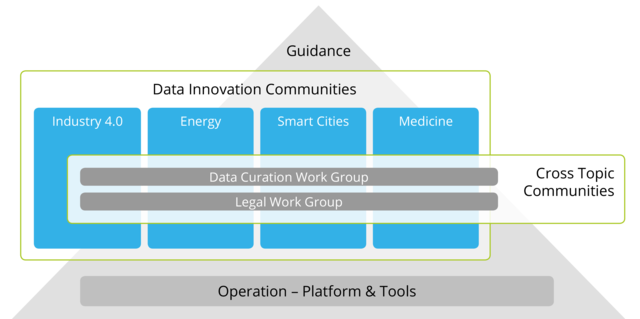SDIL – Smart Data Innovation Lab
October 24th, 2014 | Published in Research
Description
The Smart Data Innovation Lab (SDIL) is a German nationwide research initiative from the Work Group 6 of national IT Summit The SDIL has been launched by national politics and IT industry on 8th January, 2014 at the Karlsruhe Institute of Technology (KIT). The goal of the SDIL is to make a in-Memory Big Data infrastructure ready to take on the highest demands on the one hand and data generated in industrial processes on the other.
SDIL implements two major goals: First, networking between industry and research organisations which are interested in cooperation in the field of Big and Smart Data. This networking is performed in the Data Innovation Communities (DIC) and Cross Topic Communities. Second, a Smart Data Lab consisting of infrastructure of Big Data technologies, and consulting and Big Data Analytics support for running complex Big Data Analytics. The technical infrastructure is granted to SDIL by IBM (Watson/Power PC), the SAP (HANA, Intel-Server), and Software AG (Terracotta) and operated at the Steinbuch Centre for Computing (SCC). The use of the infrastructure is currently free of charge for SDIL community members, but SDIL expects that community members at some point make data available to the closed SDIL DIC community.
Big Data Analytics and Tool Support is provided by TECO. SDIL is headed by Michael Beigl (TECO/KIT) as the spokesperson and Elmar Dorner (SAP) as vice spokesperson.
Figure 1: Smart Data Innovation Lab Structure
A major outcome of SDIL is to simplify access to and use of Big Data technology and Big data resources, both human (expert) resources as well as technical resources. SDIL provides access to various software platforms (HANA, Terracotta, Watson) and hardware platforms (Intel, PowerPC) in parallel, allowing a user to select the most suitable solution for him or even to compare platforms. SDIL operates with highest security standards: Data analysed by SDIL are stored securely ONLY within KIT in Germany, and requests to access to data have to be explicitly agreed by the data owner always. SDIL also ensures simplified an fast legal procedure by providing standard legal workflows and contract templates already agreed by all SDIL partners. This allows SDIL projects to focus on data and specific outcome to the application domain. Within the adjunct SDI-X project, an open tool framework will be developed for SDIL that will allow users with no knowledge of Big Data and limited knowledge of programming and Data Analytics to run Big Data projects.
Figure 2: Basic Structure
Running a SDIL project is therefore simple for SDIL members: Step one is “booking” SDIL resources for a project by filing out a template. Then after signing the (template) contracts between the organisations involved (e.g. a company providing the data and interested in analytics, and a University performing the analytics plus the KIT as an operator) and after uploading the data the SDIL infrastructure can be used by the project. Starting the project and running the project is supported by a team at KIT consisting of TECO research group and SCC. This allows SDIL projects to focus on data and specific outcome to the application domain. Experiences of running such a project are reported to the DIC and to the operator to allow them to improve their procedures.
Start
08/01/2014 (SDIL)
01/10/2015 (SDI-X adjunct project funded by BMBF)
01/01/2019 (SDI-C)
01/01/2023 (SDI-S)
Core partners
Bayer, Bosch, EnBW, IBM, SAP, Siemens, Software AG, TRUMPF, DFKI, FZJ, FhG, KIT
Topics
Industry 4.0, Energy, Smart Cities, Medicine
Project team
Major Current members
- Prof. Dr.-Ing. Michael Beigl (SDIL Spokesman)
- Dr. Till Riedel
- Ployplearn Ravivanpong
- Yexu Zhou
- Yiran Huang
Former members
- Dr. Yong Ding
- Dr. Markus Scholz
- Martin Alexander Neumann
- Michael Hefenbrock
- Rainer Duda
On-going research projects at SDIL
- Analytics für ein Smart Air Quality Network
- Ports as Intelligent Logistics Hubs
- All-Time Parts Prediction (ATP) Demo
Completed research projects at SDIL
- Condition monitoring and prediction of sealing systems
- Optimization of product quality at OSRAM Schwabmünchen
- Enhancing traffic flow predictions with environmental models
- Optimization of the production processes at John Deere
- Examination of various Big Data platforms regarding their performance in forensic data analyses
- Requirement analysis for energetic construction measures based on historical infrastructure data
- MedTrend1: Smart Data Prediction of Trends in Medicine
- GPU + In-Memory Data Management for Big Data Analytics
- Condition-Based Maintenance: Analysis of highly variant, temporal sparsely settled, unmarked data sets for performing condition-based maintenance
- Association Rule Mining for High Dimensional Master Data
- VDAR: Verteilte Dezentrale Autonome Regelungssysteme für Dezentrale Energiemärkte
- Predictive Maintenance data analysis on SmartFactoryKL generated data
- Association Analysis for Data-driven Services based on Industrial Log-files
- Smart Brain Data Analyses — Machine Learning approach for a background segmentation of the 3D image volume of a brain tissue block
SDIL also serve as an infrastructure to analyze smart data technologies potential for SMEs under the program Smart Data Solution Center Baden-Württemberg (SDSC-BW). Please visit www.sdsc-bw.de for more information about SDSC-BW our success stories.
Contact
For further information, please visit SDIL website: www.sdil.de
Or contact us via e-mail: sdil@teco.edu






